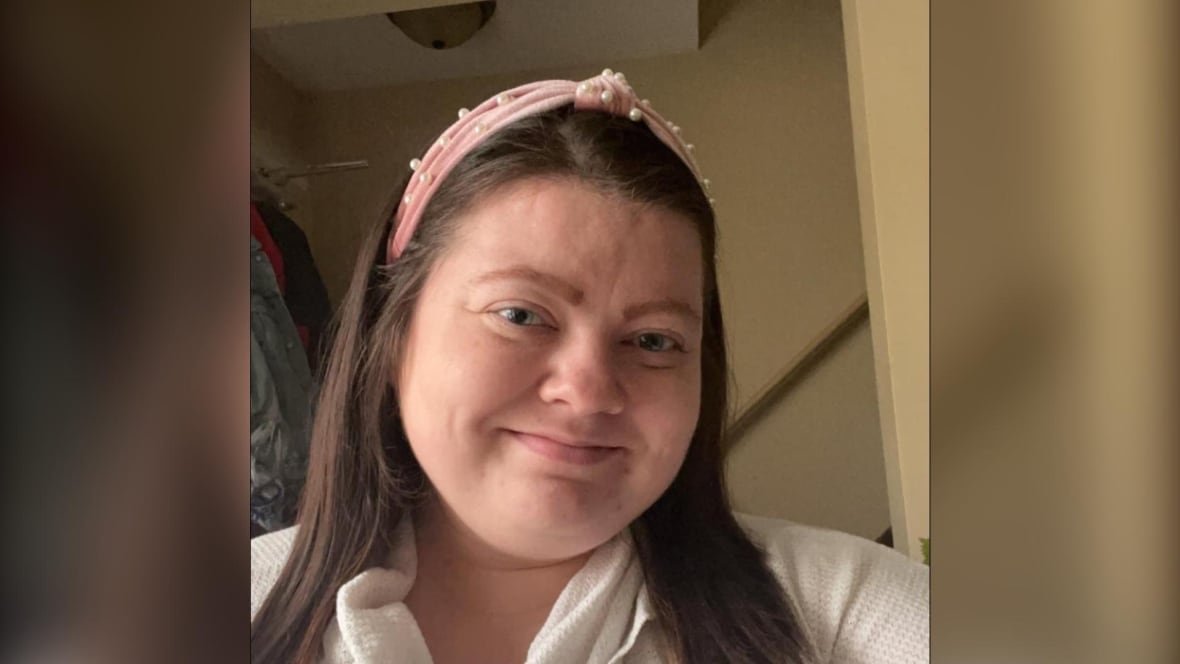On Jan. 7, 2025, Kaitlyn Braun yet again glumly stood in front of a judge, her voice strained. This time, it was in Hamilton, Ont., — but the charges were familiar.
Braun pled guilty to four charges in total: two counts of false pretences with intent to defraud, one count of intent to harass, and one count intent to injure or alarm — all related to her acts in spring 2024, when she reached out to both a birth worker and a family crisis worker, telling them she was pregnant and required emergency support.
It was a lie, and just one of many. And this wasn’t her first time in court. Because Braun, just 26 years old, is already a repeat offender, believed to have dozens of victims. This story is also the subject of a new podcast from the CBC and BBC World Service — The Con: Kaitlyn’s Baby.
Braun’s rapid rearrest underscores the challenges of the criminal justice system in addressing perpetrators like her: A young, non-violent offender with well-documented mental health struggles who has appeared to be unable or unwilling to cease doing a very specific kind of harm. She’s an unlikely candidate for a lengthy prison sentence, nor does it appear that conventional therapies have been effective.
So, what do you do with Braun — and challenging cases like these?
Kaitlyn Braun’s modus operandi
In March 2023, social media in southern Ontario lit up with a very specific signal: #doulascammer. Doulas are birth workers, but they don’t offer medical services, instead offering emotional and educational support, and sometimes physical touch like massages to help women in labour ease anxiety and pain.
Across platforms, though mostly on TikTok, doulas were sharing stories of betrayal and trauma, hoping to warn others and press authorities to act.
Kaitlyn Braun, the doulas said, had a specific modus operandi. She would approach each doula, typically over social media, with a harrowing tale: She was pregnant as the result of a sexual assault and had decided to keep the baby. Her family was disgusted, she’d say, leaving her without any meaningful support. Perhaps this doula cared enough to help?

Many of the doulas tended to Braun over the phone. It was during the COVID-19 pandemic, a time when health-care professionals and support workers became accustomed to doing their jobs remotely. Some doulas met her in person, and they, too, believed what she told them.
Braun was larger-bodied, and it was very possible she was carrying a late-stage pregnancy. And besides, the job of a doula is to stand in someone’s corner, not cast doubts on their narrative.
For some doulas, being duped into offering intimate support for Braun’s fake pregnancy was as far as it went. She confided in them, asked them to knead her aching shoulders, and had them help her in and out of the bath.
But for others, it was much worse. Over several days, Braun would take some doulas through an escalating series of disasters — including pregnancy loss, a hysterectomy, cancer diagnosis, rape and even a coma — as they struggled to help her, grieve with her, and even, so they thought, save her life.

Based on the number who shared their stories on social media and a group chat formed by Kaitlyn’s victims, some doulas estimate that Braun pulled the same con dozens of times, with possibly as many as 50 people. Braun was first arrested in March 2023, not long after the social media #doulascammer storm commenced. She was charged with a litany of offences — fraud, harassment, sexual assault — related to her web of lies. (The sexual assault charges were subsequently dropped.) But what to do with her — that was another story.
We made numerous attempts to contact Kaitlyn Braun. This included writing to her in prison, outlining the allegations made through the podcast series and inviting her to respond to what has been said. She made it clear she didn’t want to be involved with the podcast. The invitation remains open, should she change her mind.
3 major forms of serious mental illness
Public Safety Canada identifies three major forms of serious mental illness in the Canadian criminal justice system: psychotic disorders, bipolar disorders and major depressive disorders. Individuals with these forms of mental illness are disproportionately represented in the criminal system and are also more likely to grapple with barriers — including lack of housing and employment — that contribute to overall instability. Some estimates suggest that prevalence of mental illness in federal correctional institutions is three times that of the general population.
According to Amanda Butler, assistant criminology professor at Simon Fraser University, factoring mental illness into sentencing decisions is a complex situation.
“The foremost principle that trumps all other principles is the protection of society,” said Butler. “So, rehabilitation is definitely included in the purposes and principles, but it’s not always the most important from a legal perspective.”
Section 16 of Canada’s Criminal Code outlines the relationship between mental illness and the commission of a crime, but the threshold for NCR — or, not criminally responsible — requires an individual to be so ill that they’re unable to understand that their actions were wrong. (Despite her struggles with mental health, Braun’s lawyer didn’t petition the court to have her declared not competent.)
“That sets an extremely high bar that is rarely met unless a person is in a state of psychosis at the time of their offence,” she said.
This section of the Criminal Code doesn’t address defendants and incarcerated individuals who are technically considered fit and therefore responsible for their actions, and yet struggle with sometimes serious mental illness. That might be considered a mitigating factor and is often discussed prior to sentencing, but outcomes can be unsatisfying.
“We don’t have a lot of options in terms of what judges can do or in terms of treatment.”
Prison sentences, often elected with a public safety rationale, can exacerbate existing mental health conditions, and even induce new ones — all within a context of limited resources.
“If a person needs to be deprived of liberty because we have reason to believe that they are at risk of perpetuating harm, then we have to make a decision about what that looks like,” says Butler. “They’re separated from the community, but are we actually going to make them better?”
A lengthy history of mental health issues
As Braun’s first case wound its way through the system, the crown prosecutor and her lawyer offered a joint submission to Justice Robert Gee as part of a plea deal.
They requested that she receive a conditional sentence (also known as house arrest) of two years, plus three years of probation. Both lawyers explained to Judge Gee that Braun didn’t belong in prison; she had struggled with mental health issues for years. She needed serious intervention that she wouldn’t be able to get behind bars.
When examined by the court-ordered clinician, Braun shared that she had been previously diagnosed with bipolar disorder, and anxiety and depressive disorders. She also claimed to have been diagnosed with factitious disorder — where someone makes up an ailment to satisfy an emotional need. According to her medical records, from the ages of 17 to 24, she went to the hospital more than 170 times. The judge believed most of those visits were probably based on lies.
A new report examining the state of mental health in Canada shows that millions of people with mental illness are unable to get the care they need within the publicly funded system.
But because of the deliberateness of Kaitlyn’s actions, the court-appointed doctor rejected the diagnosis of factitious disorder, and said her behaviour was more consistent with borderline personality disorder.
Justice Gee was concerned about two things. One, there was no real plan to get Braun any support tailored to her precise needs. In an underfunded health-care system, with a particular paucity of resources for mental health diagnoses, what would stop her from reoffending while she waited for treatment?
Which brings us to problem No. 2: The court-ordered pre-sentence report indicated that Braun was at a high risk to reoffend; that even if she did receive treatment, she was unlikely to meaningfully engage with it.
Judges need more options: expert
When mental illness is a contributing factor to a criminal offence, Butler would like to see expanded options available to judges. There should be increased community-based options in lieu of incarceration for people with mental illness, she says, and better mental health care for those who are in custody.
Butler says we also need expanded publicly funded mental health resources and earlier interventions. In Braun’s case, the recommended therapy for borderline personality disorder is dialectical behaviour therapy, but Butler says an intensive DBT course can cost tens of thousands of dollars — and that’s in addition to often long waiting lists.
After a recess of one month, Braun was back in court on Feb. 14, 2024, to be sentenced on her original charges. Justice Gee reconvened the parties at the Brantford, Ont., courthouse and, after almost a year in custody, Braun was ordered to serve two years under house arrest and another three years of probation.
It seemed like something of a resolution to a saga that had been drawn out for almost a year. But by April, she would be back in jail for similar offences, and the cycle would begin all over again.
Braun is currently awaiting sentencing for the charges to which she pleaded guilty in January 2025.


